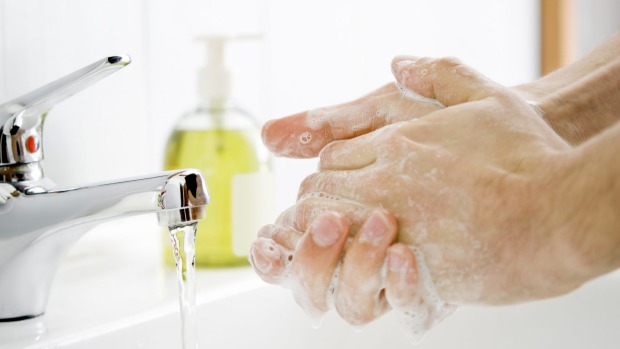
Photo: Getty Images
Long-term exposure to triclosan – an antibacterial ingredient found in some soap, toothpaste and other common household products — may lead to liver cancer in mice, according to a new study.
The finding, published Nov. 17 in the Proceedings of the National Academy of Sciences, comes amid closer scrutiny of the possible health effects of the widely used substance.
“Triclosan’s increasing detection in environmental samples and its increasingly broad use in consumer products may overcome its moderate benefit and present a very real risk of liver toxicity for people, as it does in mice,” Robert Tukey, a professor at the University of California, San Diego School of Medicine, said in a statement.
In the study, Tukey and colleagues gave mice food or drinking water containing triclosan for six months. They found that compared with control groups, the mice exposed to triclosan were more susceptible to liver tumors.
Triclosan may interfere with the constitutive androstane receptor, a protein that helps flush chemicals out of the body, the authors said. In response to this disruption, excess liver cells might proliferate, and with continued exposure, these excess cells might eventually become tumors.
The mice in the study were exposed to higher concentrations of triclosan than a typical person might encounter. But the results suggest that people exposed to triclosan over long periods might be at risk of liver damage, although more research is needed to see whether this is the case, the study researchers said.
Triclosan was developed as an antibacterial ingredient for use in a surgical scrub but is now found in cosmetics and such household products as disinfectants, plastic kitchenware, soap and detergent.
As the substance has become more common in products, it has also emerged in the environment. Triclosan is among the seven most frequently detected compounds in streams across the United States, and it has been detected in the urine and breast milk of large portions of the population, the authors said.
Triclosan’s effects on people are not well understood. The Food and Drug Administration’s Web site says, “Triclosan is not currently known to be hazardous to humans. But several scientific studies have come out . . . that merit further review.” Animal studies have hinted at potential harms. Triclosan has been found to disrupt hormones in animals such as frogs. Two years ago, a study showed that triclosan exposure impaired muscle function in mice and fish.
Regulators and lawmakers have taken note. In May, Minnesota became the first state to pass a law banning triclosan, though that rule won’t go into effect until 2017.
In December 2013, the FDA issued a proposal that would require makers of antibacterial soaps to show that their products are safe to use on a daily basis and that they work better than simple soap and water. Despite the wide use of antibacterial soaps, there is no evidence that these products are more effective than regular soap at preventing illness, the FDA said. Worse, these products may be contributing to the rise of antibiotic resistance, according to the FDA.
“I think [the new study] is a further reason to evaluate the use of triclosan in everyday products, which expose large populations,” said Stuart Levy, director of the Center for Adaptation Genetics and Drug Resistance at Tufts University in Boston, who was not involved in the research.
The type of cancer that the mice in the study developed, called hepatocellular carcinoma, is the third-leading cause of cancer deaths worldwide. Levy noted that the disease is relatively uncommon in the United States. Most cases of hepatocellular carcinoma are caused by chronic hepatitis B and C infections.
The Washington Post
